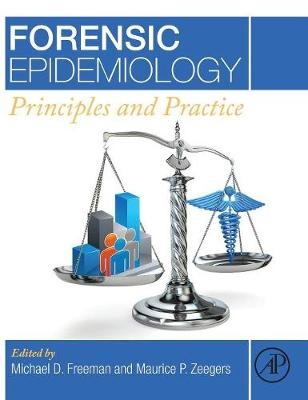
Forensic Epidemiology
Academic Press Inc (Verlag)
978-0-12-404584-2 (ISBN)
Michael Freeman is a forensic epidemiologist and consultant in forensic medicine, working in civil, criminal, and academic venues. He has provided expert testimony more than 1,000 times in a wide variety of civil cases, including injury and death litigation, product liability, toxic tort litigation, tobacco litigation, medical negligence, as well as in homicide and other criminal matters.Dr. Freeman has more than 170 published scientific papers, books, and book chapters, primarily focusing on issues relating to forensic applications of epidemiology and general and specific causation. He has published research on the topics of traffic crash-related injury and death, injury biomechanics and injury causation, genocide, cancer epidemiology, chronic pain mechanisms, and adult autologous stem cell therapy, inter alia.Dr. Freeman holds academic appointments at the CAPHRI School for Public Health and Primary Care at Maastricht University Medical Center, Oregon Health & Science University School of Medicine, and Aarhus University, Department of Forensic Medicine. He serves as an Affiliate Medical Examiner with the Allegheny County Medical Examiner's office in Pittsburg, PA. Dr. Freeman holds a doctor of medicine degree (Med.Dr., Umeå University), a doctorate in in public health with a major focus in epidemiology (Ph.D., Oregon State University), and an MPH degree (Oregon State University), inter alia. Dr. Maurice Zeegers has dedicated his career to researching bladder cancer, during which he has directed numerous research studies and randomized clinical trials to investigate the relationship between nutrition and urinary bladder carcinogenesis. He has published over 250 peer-reviewed scientific papers in the highest-ranked academic journals and is regularly invited to speak on the topic at international scientific conferences. Dr. Zeegers currently holds a Chair in Complex Genetics and Epidemiology as full professor at Maastricht University in the Netherlands, where he also serves as its Head of School and as Director of CAPHRI, the Care and Public Health Research Institute. He acts as the vice-president of the European Epidemiology Federation and holds honorary professorships in England, Belgium and China.
1. History of Epidemiology in the courts
2. History of FE
3. Basic tenets of Epidemiology
4. Different types of epidemiologic studies used in FE
5. Test accuracy
6. Statistical tests used in Epidemiology
7. Probability and the Law
8. Common logical fallacies encountered in FE
9. Causation
10. Sources of data for FE investigation
Adjunctive disciplines utilized in FE investigations
11. Medicine
12. Toxicology
13. Pharmacology
14. Biomechanics
15. Principles of death investigation
Applied Forensic Epidemiology
16. Governmental uses of epidemiologic investigation
17. FE in criminal cases
18. FE in civil cases
19. Toxic tort investigation
20. Product defect investigation
21. Injury litigation
22. Medical negligence
23. Life expectancy projections
| Erscheinungsdatum | 11.05.2016 |
|---|---|
| Verlagsort | San Diego |
| Sprache | englisch |
| Maße | 191 x 235 mm |
| Gewicht | 1000 g |
| Themenwelt | Recht / Steuern ► Strafrecht ► Kriminologie |
| ISBN-10 | 0-12-404584-7 / 0124045847 |
| ISBN-13 | 978-0-12-404584-2 / 9780124045842 |
| Zustand | Neuware |
| Haben Sie eine Frage zum Produkt? |
aus dem Bereich


